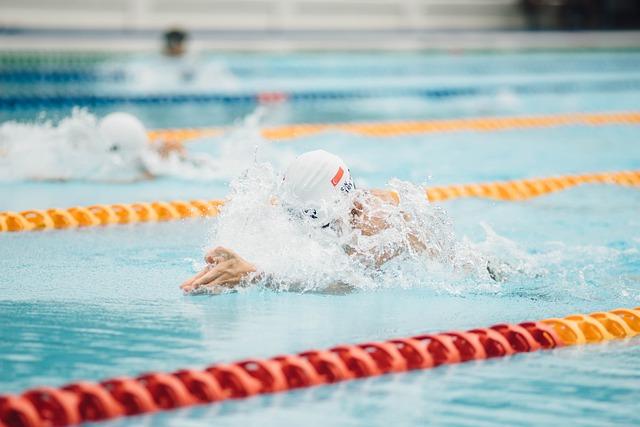From Black Olympic Swimmers to ‚Ā£Coaches: Building a New Legacy in Swimming
in ‚Äća sport historically dominated by a narrow demographic, the rise of Black ‚Ā§Olympic‚ÄĆ swimmers transitioning into coaching roles marks a transformative chapter‚Äć in swimming’s narrative. As awareness‚Ā§ of ‚ĀĘdiversity and inclusion gains momentum across various athletic disciplines, ‚Ā§the swimming community is witnessing a‚Ā£ wave ‚Ā£of change led ‚ÄĆby those who have ascended ‚Äčto ‚Ā£the peak of ‚ÄĆtheir sport. This movement‚Ā£ not only‚Äč aims to inspire the next‚Äč generation of swimmers but also‚Äč seeks to dismantle barriers rooted in systemic inequalities ‚Ā§within aquatic sports. With a focus on cultivating talent, fostering representation, and nurturing a love for swimming, these former athletes are not just passing down their ‚Ā£skills;‚Äč they are ‚ÄĆinvesting in a legacy that promises to redefine the‚Ā£ face of competitive swimming ‚Ā§for‚Ā£ years to come. In this article, we delve into the stories of these pioneering figures, exploring their journeys from Olympic glory to coaching and the ‚Äćimpact they are making in shaping a more inclusive future for the sport.
The Rise‚ĀĘ of Black Excellence in Olympic Swimming
In ‚ÄĆrecent years,the ‚ĀĘlandscape of Olympic swimming‚ĀĘ has ‚ÄĆwitnessed a‚ÄĆ significant transformation,characterized by the‚Äč emergence of ‚Ā§a new‚Äć generation of talented Black swimmers ‚Ā§who are not ‚Äčonly breaking‚Äč records but also redefining the narrative of ‚Äčthe sport. Athletes such as Simone Manuel, ‚ÄĆwho made‚Ā§ history as the first Black woman to win an individual Olympic gold medal in swimming at‚Äč the‚Ā£ 2016 Rio Olympics, and Cullen ‚ÄčJones, who became a symbol of inspiration with ‚ÄĆhis achievements, have paved the way for aspiring swimmers from diverse backgrounds.Their accomplishments go beyond medals; they serve as a beacon of hope for many, showcasing that excellence in swimming is attainable regardless of race.
As these athletes transition to coaching‚Ā§ roles, they are further‚Ā£ solidifying ‚Äčtheir‚Ā£ impact‚Äč on the sport, nurturing a new generation of swimmers who reflect the diversity of the community.‚Äč Initiatives aimed at promoting ‚Äčswimming in underrepresented areas are seeing ‚Ā§increased participation and support, which is crucial for the growth of the sport.Notable contributions include:
- Swim clinics that focus on technique and confidence‚Ā§ building.
- Mentorship programs pairing young swimmers with experienced professionals.
- Outreach ‚Ā§efforts to‚ÄĆ raise awareness about water safety and swimming opportunities.
| Athlete | Notable Achievement | Coaching Contribution |
|---|---|---|
| Simone Manuel | First Black woman to win ‚Äćgold in 100m freestyle | Leading diversity initiatives in swimming |
| Cullen Jones | First Black man to set‚ĀĘ a ‚ÄĆworld record‚Ā£ in swimming | Launching swim safety programs |
Navigating Challenges:‚Äč The ‚Ā£Journey from Athlete to Coach
The transition from‚Äć athlete ‚ĀĘto coach can be especially intricate for former ‚ÄćOlympians who have faced‚ÄĆ unique challenges in ‚Ā£their sporting careers. For Black Olympic swimmers, this journey frequently enough encompasses not only personal growth but also a commitment ‚ÄĆto‚Äč changing ‚Äćthe‚Ā£ landscape ‚Äčof swimming for future generations. Navigating institutional ‚ÄĆbarriers, cultural perceptions, and the struggle for representation, ‚ÄĆthese athletes emerge as coaches poised to inspire and empower‚Äć young swimmers from ‚Äčdiverse‚Ā£ backgrounds. Their firsthand experience ‚Ā£of ‚ĀĘovercoming ‚ÄĆobstacles equips ‚Äćthem with invaluable insights that can be pivotal in fostering an inclusive habitat within the‚ÄĆ sport.
In this new ‚Äćrole, these coaches become role models, using their expertise to build a legacy that honors their own journeys while paving the way for others. Key ‚ÄĆelements of their coaching beliefs ‚Äćinclude:
- Emphasizing the importance of mentorship
- Creating supportive training environments
- Encouraging community engagement and outreach
To effectively measure the impact of their methods, many coaches utilize performance metrics that highlight not just athletic achievements, but also personal growth in their athletes. The following table illustrates some ‚Äčof the emerging success stories from their coaching programs,reflecting a commitment to cultivating future champions:
| Swimmer ‚ÄćName | Achievements | Coach |
|---|---|---|
| Kayla Johnson | 2x National Champion | Coach Amani Smith |
| Jordan Lee | Junior Olympics ‚Ā§Gold | Coach DeShawn Turner |
| Maria Garcia | State Champion | Coach Tasha‚ĀĘ Williams |
Fostering Inclusion: ‚ÄčStrategies for Developing Future Generations‚ÄĆ in Aquatics
To effectively foster an inclusive ‚Ā§environment within aquatic sports,it is essential to leverage the rich legacy of Black olympic swimmers who have paved‚Äč the way ‚Äćfor future generations. By establishing mentorship programs that‚Ā§ connect aspiring athletes with seasoned professionals, organizations can‚Ā§ create a pathway ‚Ā§to success.Such programs should incorporate the ‚Ā§following‚ÄĆ key‚ĀĘ components:
- Mentorship Pairing: Pair ‚Ā£young athletes ‚ĀĘwith ‚Ā£experienced swimmers or coaches who share similar backgrounds and ‚ÄĆexperiences.
- Skill development Clinics: ‚Äć Organize workshops‚ĀĘ focused on ‚ĀĘtechnical skills, alongside discussions ‚Äčon overcoming ‚Äčbarriers in competitive sports.
- College Scholarship‚Ā§ Resources: Provide facts ‚Ā£and support‚Ā£ for scholarships specifically targeting underrepresented groups in aquatics.
Encouraging ‚Ā§collaboration between Black athletes and existing swim organizations is crucial for lasting change. Initiatives that promote inclusivity must involve community outreach to build awareness and participation. A strategic approach can be articulated through:
| Action‚ĀĘ Item | Description |
|---|---|
| community Swim Days | Host open ‚Ā§swim events that welcome ‚Ā§families and encourage diverse participation. |
| Diversity workshops | Educate coaches and staff on ‚Ā£cultural competency and ‚ÄĆthe importance of representation. |
| Showcase Events | highlight ‚ĀĘBlack swimmers’ achievements through competitions and exhibitions to inspire youth. |
In Summary
As the tide of ‚ÄĆrepresentation continues to‚ÄĆ rise within the world of competitive swimming, the journey from black Olympic swimmers to influential coaches is not just a story of‚Äč personal achievement, but a ‚ÄĆcollective movement‚Ā§ toward a more inclusive future‚Äč in the sport. These pioneers, who have broken barriers and set records, are now leveraging ‚Ā£their experiences to ‚Ā§inspire the next generation of swimmers. By sharing their knowledge and passion for the sport, they are fostering‚ÄĆ an environment where diversity thrives, and young athletes can see‚Ā£ reflections of themselves in leadership roles.As we follow‚Ā£ this evolving narrative,‚ĀĘ it’s clear that the legacy they are building will not only reshape swimming but also pave the way‚Äč for broader changes within the athletic community. The ongoing ‚Äčcommitment of these coaches ensures that the‚ĀĘ waves they create ‚Äčwill‚Äć be felt for‚Äč years to come,making the ‚Ā§pool a more welcoming and equitable‚Ā§ space for all.





